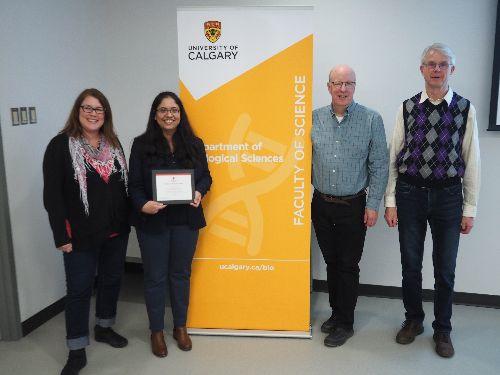June 14, 2019
Dr. Mohita Sharma: Winner of the Edward R. McCauley Award

Dr. Mohita Sharma
Initially drawn to the Biological Sciences at an early age, Mohita has always “found everything related to biology fascinating”. Her early passion has continued into her professional career, as Mohita now works as an Environmental Microbiologist. She received her PhD in Environment and Industrial Biotechnology, during which she worked with oil and gas industry partners in India to complete petroleum microbiology-based projects. These projects eventually led her to the University of Calgary and the Petroleum Microbiology Research Group (PMRG), which is one of the most highly recognized petroleum microbiology focused research groups in the world. Mohita describes her time spent at the University of Calgary as “very good and productive. It has given me very good academic and industry exposure, and has provided me with lot of exciting opportunities.”
This year’s recipient of the Edward R. McCauley Award, given for recognition of Postdoctoral Research Excellence in the Biological Sciences, Mohita and her work have received an incredibly positive response from the professional community and on Google Scholar she has more than 400 citations for her 20 research papers. She describes her work as “focused on emphasizing the need for energy balance between the renewable industry and the fossils industry” and how this balance “is the need of the hour for a sustainable future”. She was awarded a Mitacs scholarship to work with Shell Canada and Shell Houston USA, to help pursue this vision and to help communicate her message to as many people and forums as possible.
When explaining her research Mohita states her goal is to start a career in the oil and gas industry, where she would be able to continue her research mission to provide a balance between the renewable and fossil industries. She is aware of the special implications her work has on Calgary, and Alberta, and states that:
“My work has mainly revolved around microbial activities in oil and gas operations that can be both beneficial and detrimental. The microorganisms I work with can play a beneficial role in enhancing energy production by recovering chemicals from waste streams and bioremediation, but can also be responsible for damaging oil and gas infrastructure due to corrosion or souring. Keeping these issues in mind, the threat of global warming and the need to diminish fossil fuel resources is creating an ever-increasing drive to implement new technologies for sustainable fuel production. My research is focused on designing simple bioelectrochemical systems (BES) in order to study different metabolic activities of microorganisms associated with oil and gas systems, to benefit the environment and oil and gas companies.”
Mohita has worked extremely hard and dedicated herself to her research in the Biological Sciences, which is clear from her many accomplishments and the passion that she continues to radiate when speaking about her work. For future students, Mohita says that “A researcher’s career is full of uncertainties and anxieties, but despite the numerous challenges that will happen in any research journey, I feel one should not let any anxieties overpower you. If you keep your focus sharp and motivations high while striving forward, you will succeed.” With individuals who have such a positive mindset, and such faith in the future of science and environmentally responsible industry, it is impossible not to be excited about the possibilities that lay ahead for Biological Sciences research.
A poem that Mohita looks to for motivation:
Be The Best of Whatever You Are
Douglas Malloch
If you can't be a highway then just be a trail,
If you can't be the sun be a star;
It isn't by size that you win or you fail--
Be the best of whatever you are!
An Article by Glynndon Dobson
